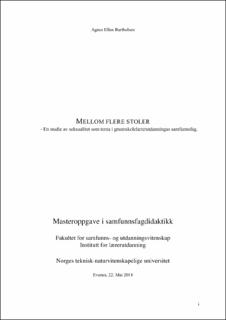| dc.contributor.advisor | Solhaug, Trond | |
| dc.contributor.advisor | Svendsen, Stine Helene Bang | |
| dc.contributor.author | Bartholsen, Agnes Ellen | |
| dc.date.accessioned | 2020-10-02T05:46:18Z | |
| dc.date.available | 2020-10-02T05:46:18Z | |
| dc.date.issued | 2018 | |
| dc.identifier.uri | https://hdl.handle.net/11250/2680772 | |
| dc.description.abstract | I samfunnsfaget i den norske grunnskolen er seksualitet tydelig adressert gjennom skolens styringsdokumenter og gjennom kompetansemål i faget. På tross av dette opplevde jeg manglende kunnskap på feltet etter endt grunnskolelærerutdanning.
Gjennom denne masteroppgaven har jeg derfor søkt å undersøke på hvilken måte seksualitet belyses i lærerutdanningas samfunnsfag. Dette har jeg gjort gjennom å undersøke pensumlistene til syv forskjellige grunnskolelærerutdanninger. Jeg har også gjennomført kvalitative forskningsintervjuer med fire informanter. Informantene er rekruttert fra ulike institusjoner og har gjennom sin stilling hatt mulighet til å uttale seg om undervisningspraksis tilknyttet seksualitet.
Med utgangspunkt i teori knyttet til medborgerskap, har jeg forsøkt å gjøre rede for hvilke medborgerskapsperspektiver fremgår i pensumlitteraturen og informantenes fremstilling av undervisningspraksis. Undersøkelsen viser at seksualitet som tema i samfunnsfaget på lærerutdanninga er preget av store variasjoner. Ved enkelte institusjoner er temaet påfallende fraværende mens det på andre institusjoner behandles på en mer omfattende måte.
Utdanningene som tematiserer seksualitet gjør dette på ulikt vis og i ulik grad. Felles for alle er at de definerer samfunnsfagets mandat til å gjelde et moral-perspektiv. Mens de på den andre siden knytter den biologiske siden av seksualitet til naturfaget. Fravær av seksuell praksis i samfunnsfaget fører til en begrensning av barn og unges mulighet til seksuell autonomi og handlingskompetanse, noe som kan ha konsekvenser for barn og unges mulighet til å sette grenser.
Fraværet av praksis er også problematisk fordi en risikerer og redusere skeive til å bli et spørsmål om identitet. Informantenes fremstilling av praksis på feltet og litteraturgjennomgangen viser at samfunnsfaget har unike muligheter til tematisere seksualitet på en omfattende måte gjennom medborgerskapsperspektiver. Dette er også en mulighet som ser ut til å bli betydelig styrket gjennom nye læreplaner for grunnskolen og grunnskolelærerutdanninga. | en_US |
| dc.description.abstract | -
In social studies in the Norwegian Elementary School, sexuality is heavily addressed on through the schools’ management documents and Competence Aims in the course. Despite all of this, I felt a lack of knowledge on the topic after completed Elementary teacher education.
That is why, through this master’s assignment, I have chosen to attempt to study in what way sexuality is viewed as in the teacher’s Social studies education. I have achieved this through researching the curriculum of seven different elementary teacher programs. I have also completed qualitative research interviews with four informants. The informants have been recruited from different institutions and through their position have had an insight to express themselves about the educational practise directly in connection to sexuality.
With an origin in theory connected to citizenship, I have attempted to account which citizenship perspectives emerge in the curriculum literature and in the informant’s representation of the educational practise. The study shows that sexuality, as a topic in social studies, in the teachers’ education is characterized with big variations. At some institutions the topic is clearly absent, while at other institutions it is treated in a more comprehensive way.
The educations that portray sexuality do so in their own way, and in different levels. What they all have in common is to define social studies’ mandate to portray it in a moral perspective, while the other side connects the biological part of sexuality into science studies. The absence of sexual practice within social studies leads to children and youth limitations within sexual autonomy and self-efficacy. something that could potentially lead to consequences for children and youth’s ability to say “no”.
The absence of this practice is also problematic because of the risk to limit queers to become a question of identity. The informants’ depiction of practice within the field and the literature revision shows that social studies has unique possibilities to thematise sexuality in a coherent way through citizenship perspectives. This is also an opportunity that seems to be considerably strengthened through new curriculums for elementary schools and the elementary teacher education | en_US |
| dc.language.iso | nob | en_US |
| dc.publisher | NTNU | en_US |
| dc.title | Mellom flere stoler - En studie av seksualitet som tema i grunnskolelærerutdanningas samfunnsfag | en_US |
| dc.type | Master thesis | en_US |
| dc.subject.nsi | VDP::Samfunnsvitenskap: 200 | en_US |
